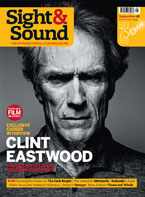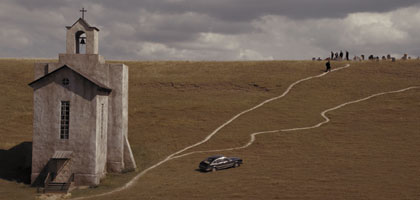Primary navigation


Andrey Zvyagintsev's visually powerful and haunting second film explores the themes of family and masculinity in crisis says Julian Graffy and confirms the director's place at the forefront of the new wave of Russian cinema
When 39-year-old Andrey Zvyagintsev arrived in Venice for the Festival in August 2003 he was almost completely unknown even in his native Russia. But the three half-hour films he had directed for the REN-TV series The Black Room in 2001 had so impressed Dmitry Lesnevsky, the series producer and general director of REN-TV, that Lesnevsky had encouraged him to make his first feature, The Return (2003), the film he was now bringing to Venice. A week later this dark, enigmatic film had won not only the prize for best debut feature, but also the Golden Lion itself, eclipsing the achievement of Zvyagintsev's great Russian namesake, Andrei Tarkovsky, whose first feature Ivan's Childhood (Ivanovo detstvo) had shared the Golden Lion in 1962. Despitea Russian tendency to look askance at artists whose fame is first achieved abroad, The Return later won the two main Russian film prizes for 2003, the Nike and the Golden Eagle. In 2004 the film was distributed around the world gathering praise and prizes inequal measure.
Naturally there was great interest in what Zvyagintsev would do next but he made his admirers wait. The Banishment,an adaptation of The Laughing Matter, a little-known 1953 novella by the Armenian-American writer William Saroyan, did not surface until the 2007 Cannes Film Festival. The film's length and stately pace divided critics and the film won 'only' the Best Actor Prize for Konstantin Lavronenko who was cast, as he was in The Return, as a troubled hero. It has taken over a year for the film to get a British release.
The opening of The Banishment has the engrossing boldness of a thriller, as a car with a wounded driver speeds through an ugly industrial town in a nocturnal rainstorm. These urban scenes are shot in ominous, unsettling blues and greys, punctured only by the red of blood, so it is unsurprising that Alex, the film's brooding central character and the wounded man's brother, decides to take his wife Vera and his children to his childhood home in the country. The move is initially represented as a liberating journey from darkness into light, from concrete to rolling grasslands. As in The Return, however, a trip away from the family home leads to tension, violence and death.
When Vera tells him that she is expecting someone else's child, Alex is devastated. The Banishment continues the examinations of the family and of masculinity in crisis that Zvyagintsev began in The Return. The rupture in that story was between a father and his sons, but here it is as a husband that Alex is found wanting. Though the plot initially represents him as the wronged party, his inability to listen to his wife or to show her compassion soon marks him as tainted. It is symptomatic that he turns for advice to his brutal brother Mark whose own family is broken. In his state of emotional banishment Alex concludes that his friend Robert is the father of Vera's child. At the heart of his failure is a failure of love, indicated in a scene in which he reads to the children at bedtime from St Paul's First Letter to the Corinthians, one of a number of biblical allusions in the film: "Though I speak with the tongues of men and of angels, and have not charity, I am become as sounding brass..." In a film pervaded by death, it is Alex who seems deadest of all.
The Banishment is told with the same dazzling assurance that so entranced viewers of The Return. Cinematographer Mikhail Krichman worked on the earlier film and has again produced compositions of staggering grandeur. Scenes shot through windows speak of estrangement and anxiety. One wonderfully composed sequence on a train at the start of the film sees the parents sitting on either side of the carriage, their children's heads on their laps. Both of their wedding bands are clearly visible but between them lies an aching chasm.
The eloquence of the visual resolution of a film in which there is little dialogue is matched by the brilliance of its soundtrack. The haunting music of Arvo Pärt is used to orchestrate scenes of strong emotion and the sounds of wind and rain recall the films of Tarkovsky, but many of the sequences set in the countryside are shot in silence. When this silence is shattered by the noise of phones and cars - the two means of connection with the town where the unspoken tragedy occurred - their harsh, unbearable screeching turns them into channels of Alex's rage.
The settings of The Banishment are never specified. The names of the characters - Alex, Vera, Max, Robert, Viktor, Liza and soon - could make them Russian, but they could equally be of any other European nationality. These features, along with the temporal vagueness, the spareness of the dialogue and the thinness of the plot, suggest that Zvyagintsev aspires to tell an abstract story about fundamental human emotions, rather as Aleksandr Sokurov did in a similar setting in Mother and Son (1997), or as Ivan Vyrypaev did in another ambitious recent Russian film, Euphoria (2006).
This is a story of greater moral complexity than that of The Return, but with greater ambition comes risk. In narrative terms The Banishment is frustrating. The cause of Mark's wounding, rendered with such dramatic energy in the opening sequence, remains defiantly unexplained. Mark's sudden death from a heart attack follows too closely after Vera's to be convincing. Dark family secrets, hinted at in words and by smashed photographs, remain just that. Above all the film's dramatic narrative twist is clumsily rendered. Intended to disorientate, it comes over as contrived.
The plot of The Return did not directly concern the boys' mother and grandmother and so was played out in their absence. The Banishment, however, is as much the story of Vera's anguish as it is of Alex's emotional blankness, yet neither the script nor the film's structure give Vera the chance to articulate the cause of her despair to her husband. Her lie to Alex about the paternity of her child is posthumously revealed to have been an attempt to melt his cold heart. It stretches credulity that a character who would take this risk would not dare to tell the truth. Vera's one big speech, to Robert, is heard only in flashback, giving the impression that Zvyagintsev is insufficiently interested in her. Her eventual reduction to a plot device, sacrificed so that Alex can repent, is both troubling and dramatically debilitating. And yet, for all this, The Banishment is a visually powerful and haunting film.
Sight & Sound has reported more than once in recent months on the difficulties involved in getting the work of foreign auteurs onto British screens, but now there is a new wave of exciting Russian directors whose work demands attention. Though Boris Khlebnikov and Alexei Popogrebsky's Koktebel (2003) enjoyed some success in Britain, their ambitious solo films - Khlebnikov's comic and formally daring tale of provincial life, Free Floating (2006) and Simple Things (2007), Popogrebsky's wise and rueful examination of the life of a St Petersburg doctor - remain unreleased here, as do two brilliant studies of troubled young men, Kirill Serebrennikov's Playing the Victim (2006) and Sergei Loban's Dust (2005). All of these directors and others are producing confident and compelling work but on the evidence of his first two films Andrey Zvyagintsev remains the most ambitious and audacious of them all.